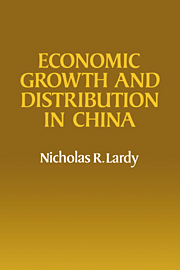Book contents
- Frontmatter
- Contents
- List of tables
- Preface
- Map
- 1 Economic growth and equity in a dualistic economy
- 2 Centralization of economic and financial planning, 1949–1957
- 3 The 1958 decentralization
- 4 Economic planning since the First Five-Year Plan
- 5 China's distributive policies in comparative perspective
- Appendix A Tables
- Appendix B Government administrative structure
- Notes
- References
- Index
1 - Economic growth and equity in a dualistic economy
Published online by Cambridge University Press: 21 September 2009
- Frontmatter
- Contents
- List of tables
- Preface
- Map
- 1 Economic growth and equity in a dualistic economy
- 2 Centralization of economic and financial planning, 1949–1957
- 3 The 1958 decentralization
- 4 Economic planning since the First Five-Year Plan
- 5 China's distributive policies in comparative perspective
- Appendix A Tables
- Appendix B Government administrative structure
- Notes
- References
- Index
Summary
The degree of central control of resource allocation is one of the most important aspects of our understanding of China's experience. In recent years, there has been increasing agreement that the rate of growth of gross domestic product since 1949 in the People's Republic has been impressive, not only in comparison with other large densely populated less-developed countries, but particularly compared with China's pre-1949 growth experience. Performance in the industrial sector has been especially strong. It is, however, more difficult to judge the extent to which the character of Chinese economic growth and social development has been influenced by the central government's control of the resource-allocation process. In particular, little is known about whether China's relatively favorable growth performance has been accompanied by comparable achievements of welfare and distributional goals and, if so, to what extent centralized economic policy is an important explanatory variable.
A growing body of evidence suggests that the initial stages of modern economic growth have frequently or even usually been accompanied by increasing inequality in the distribution of personal income. Although data on the distribution of income in developing countries are particularly weak, it appears that the benefits of rapid economic growth have not been broadly distributed, but in many cases have accrued primarily to the upper 40 percent of the population.
- Type
- Chapter
- Information
- Economic Growth and Distribution in China , pp. 1 - 48Publisher: Cambridge University PressPrint publication year: 1978



